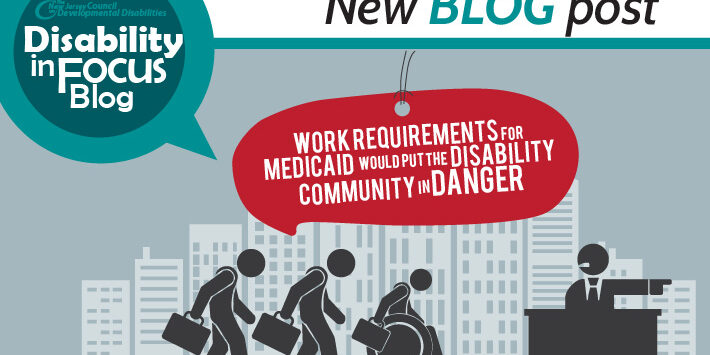By: Jeremy Einbinder
One of the most comprehensive government programs in the United States is Medicaid, which is tasked with providing healthcare and funding for support services to people with disabilities and the poor. Over the past several months, leaders in Washington have revived proposals allowing states to impose work requirements for Medicaid recipients.
NBC News columnist and attorney Katie Tastrom detailed the effects of the possible requirements on the disability community, the members of which could be culled after the eligibility process changes. Tastrom explains:
“My first concern involves the eligibility process. According to the Washington Post, states will be able to decide for themselves who qualifies as ‘disabled’ for the purpose of being exempt from the work requirement. No matter how broad they define the category, there will be disabled people who do not qualify for the exemption even though they should.”
She goes into more detail about the difficulties of qualifying for benefits, saying,
“Many people who eventually do qualify for benefits have to go through several appeals that can take
years. And even if the standard for Medicaid work-requirement exemption is much more lenient than the standard for social security, it still grants the state a mechanism requiring people to fight for coverage they should be entitled to.”
The administration told state Medicaid directors in January it would support states seeking waivers to issue work requirements, or community engagement requirements. It said those requirements would “promote better mental, physical, and emotional health” and help families “rise out of poverty and attain independence.”
The column concludes presenting the scenario in which people struggle to get coverage as a sort of Catch-22. Tastrom says,
“In the end, many people could become stuck in a grey area: too sick or disabled to work, but not sick or disabled enough to be exempt from the work requirement. Barring the possibility that they find an employer sympathetic to his or her special needs, the only way to get out of this in-between space is to eventually become sick or disabled enough that they are eligible for Medicaid. By that time their health care will be much more expensive to the state (if they survive that long).”
This presents a very glaring problem: Whether the government likes it or not, there are people who are too sick or disabled to work, at one time or another.
Disability rights activists point out that Medicaid provides necessary health care as well as long-term supports and services for millions of people with disabilities. Because of the activists’ efforts, proposals to add work requirements have so far been stalled, but it is not a guarantee that they stay as such. A report from The Hill explains,
“From some of the earliest days of the administration, Trump administration officials signaled they were open to states imposing work requirements for ‘able-bodied’ people on Medicaid.”
The obvious concern, as previously stated, is that who qualifies as “able-bodied” is not completely clear. Disability is a fluid state, and the abilities of a prospective worker, whether they have a diagnosed condition or not, aren’t guaranteed to stay the same. Aside from fluctuations, there are disabilities which are not visible, which are not apparent to the government or to advocates of these requirements. This may result in someone who in fact cannot survive without benefits, going without benefits. Not everyone can work at all points in their adult lives. This is not how need-based programs like Medicaid are supposed to work. People who cannot afford medical care on their own still need medical care. Kentucky’s push for work requirements to qualify for Medicaid seems somewhat generous at first glance. The Hill says,
“Kentucky’s program also exempts ‘medically frail’ individuals, such as people with cancer, blood-clotting disorders, or alcohol or substance abuse disorders.”
Those are very few criteria which do not encompass all of what it means to be “medically frail” or otherwise unable to work, which means that people will inevitably fall through the cracks and not get the medical care they need to survey.
“Kentucky governor Matt Bevin said many of the newly eligible are able-bodied, and said they had a moral responsibility to work for their benefits. This makes it clear that in the mind of Bevin and others who support policy like this, that the ability to continue living is a privilege only for those with access to money or the ability to perform so-called “productive labor.” This is a dangerous mindset, one that says human beings must justify their right to exist. While it might not be intentional, the impact of denying people access to healthcare will result in more poor people and people with disabilities dying.
In a survey of 667 physicians asked about work requirements, the results were not promising. Roughly 56 percent said they view the policy “very favorably” and 17.8 percent said they felt “somewhat favorably.” About 9 percent of physicians gave the work requirement a “very unfavorably” vote and about 8 percent said they felt “somewhat unfavorably.” Another 8 percent of respondents were neutral.
“The survey strongly suggests that the majority of physicians would like to move away from the Medicaid status quo," said Travis Singleton, executive vice president of Merritt Hawkins. “Many physicians have been frustrated for years because Medicaid often pays less than their costs of providing care. Physicians have to limit the number of Medicaid patients they treat for that reason and want to focus on those who need care the most.”
If the issue is one of funding, where physicians are concerned with a program paying an incomplete amount for their care, the solution is not to starve the program. The solution is to improve it.
Share This Article







